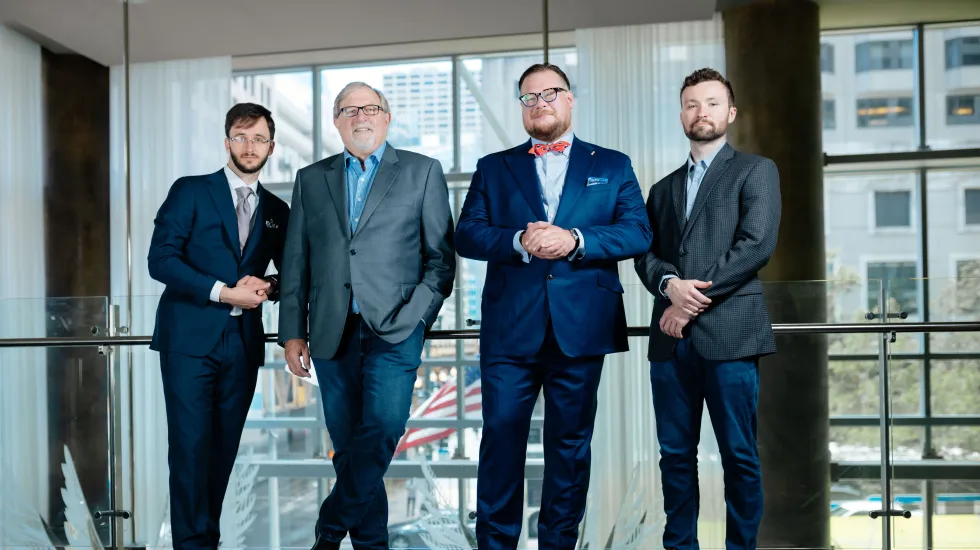
Hog Butcher for the World, Tool Maker, Stacker of Wheat. It’s the Chicago of Carl Sandburg’s day. How about Preserver of Fruits and Vegetables?
It doesn’t sound like us. We are great consumers of fruits and vegetables, and no doubt some produce rots as it makes its way through our tangled rail and highway networks. Extending the shelf life of perishables is the business of an emerging Chicago company that has made growers and environmentalists take notice.
Hazel Technologies is its name. Born during coffee-shop conversations among three Northwestern University students in 2014, Hazel now counts more than 250 customers and has gone through four fundraising rounds, the last of which was its biggest at $70 million.
In that context, the $1.5 million in grants the company has gotten from the U.S. Department of Agriculture is small, but it’s huge in terms of credibility. The USDA, said Patrick Flynn, Hazel’s chief marketing officer and a co-founder from the coffee shop days, repeatedly has recognized the company is on to something novel and validated by academic research.
The company works with manufacturers to produce chemical compounds in packets. Growers or food distributors toss these packets into each produce box. The compounds release a harmless gas over time that inhibits mold and the overall decaying process. Flynn said the general rule is the product gets a 40% increase in shelf life, so something good for 10 days can make it to 14.
Hazel has two sites in California, but Chicago is home to most of its 85 employees. To accommodate its growth, the company last week officially moved from the campus of the Illinois Institute of Technology to spiffy digs in Fulton Market. It has leased 54,000 square feet in a new building from Tishman Speyer and developer Mark Goodman at 320 N. Sangamon Ave. Its two floors include an 8,500-square-foot lab.
The patented products, which might someday be sold directly to consumers, could reduce food waste and help the world feed more people. Flynn said research in this area is hard to come by, but industry experts believe a third of harvested produce is never eaten.
Preventing spoilage is a competitive business, but many applications require produce get an anti-fungal dip or wash. Hazel’s approach, by comparison, boasts goof-proof ease. “The food supply chain already is very complex, so if you’re going to suggest an improvement, then it has to be very simple to integrate,” Flynn said.
Major customers include the foodservice provider Sysco; Oppy, the largest distributor in Canada; and Mission Produce, which bills itself as the world leader in avocados. Flynn said important business lines for Hazel include okra, apples, cherries, grapes, peaches and apricots.
“The manufacturing is overseen by us very closely still to this day, even at the larger scales, and all the products are made in the U.S., so that’s very important to us,” he said. In 2020, Hazel was honored for “best sustainable packaging” at the World Food Innovation Awards.
Other co-founders of the company are Adam Preslar, the chief technology officer, and CEO Aidan Mouat. When the Northwestern trio hatched the idea for the company, Preslar and Mouat were completing their doctorates in chemistry, while Flynn was finishing undergraduate studies in computer engineering. The company later added Parker Booth as chief operating officer.
What’s behind the name Hazel? It was Preslar’s grandmother’s name, and it just clicked. “It exuded the green and sustainable ethos we wanted, but it wasn’t one of those words you hear every day, like ‘fresh,’” Flynn said.
Chicago is closely associated with corn and soybeans, where perishability isn’t the concern. But Flynn said the city’s historical links to the farming life have made it a good place for Hazel to root. The city has a culture of innovation supported by its universities, plus a lot of business leaders and funders familiar with agriculture, Flynn said. “In a way, we are redefining what ag innovation is in Chicago.”
In the next few years, Hazel will work on international expansion. “Only about 10% of fresh produce production is in the U.S.,” Flynn said, “so really our vision for the new office is to be our global headquarters.”
If that comes to pass, there are two conclusions worth drawing. One is don’t underestimate what might come out of coffee shop chitchat near a campus full of brainiacs. And the other is to make something with user instructions as simple as, “Toss packet in box.”
Editor’s note: This article was updated to correct Patrick Flynn’s title. He is Hazel Technologies’ chief marketing officer.







